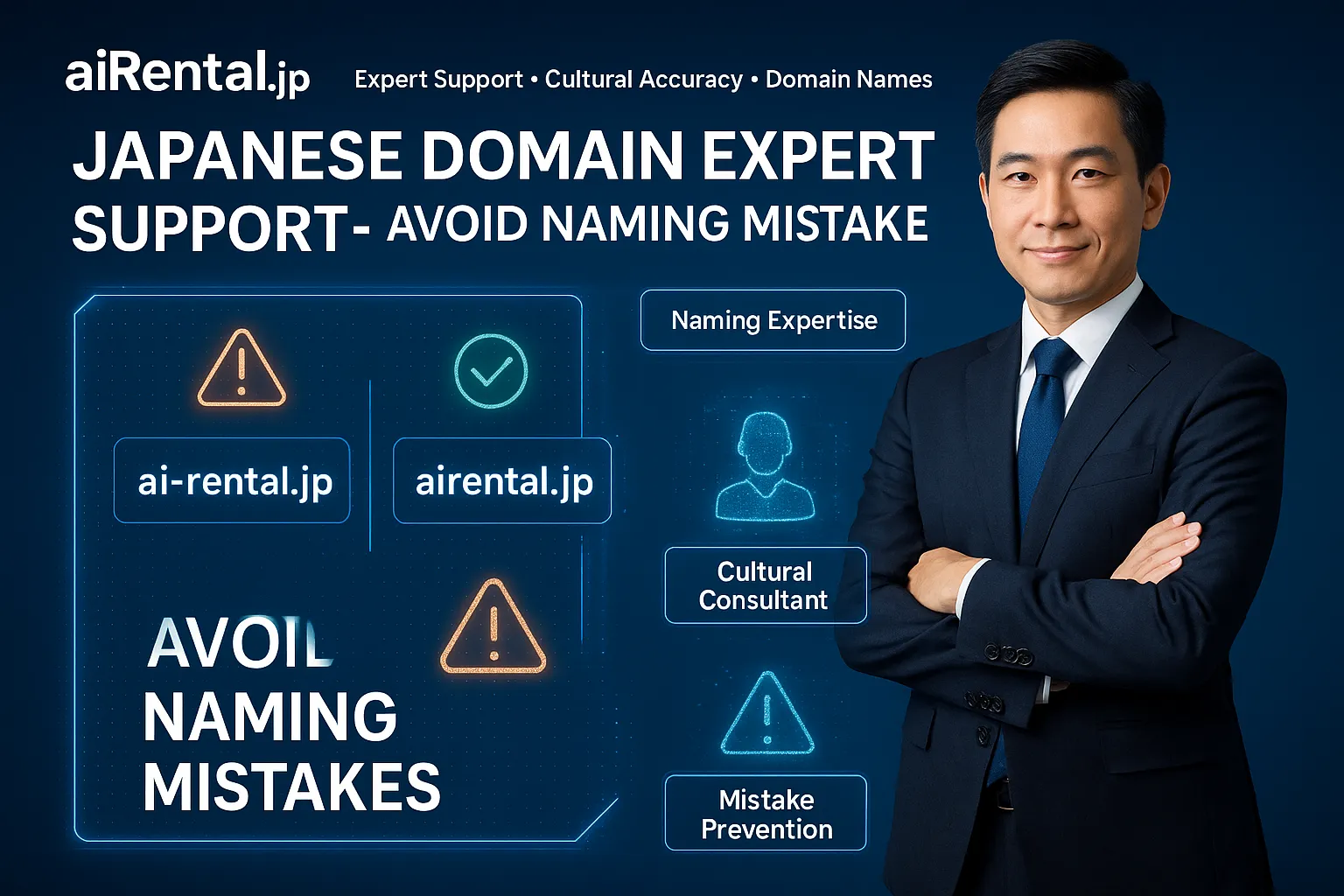- Introduction – Why Japanese Domains Depend on Language Choices
- 1. Pitfalls of Japanese Writing Systems
- 2. Length and Memorability Issues
- 3. Pronunciation and Misreading Risks
- 4. Case Studies of Branding Failures
- 5. The Role of Native Experts
- 6. Risks for Startups
- 7. Reliable Support Services
- Conclusion – Native Expertise Protects Brand Value
Introduction – Why Japanese Domains Depend on Language Choices
For overseas companies entering Japan, securing a .jp domain is a critical step in brand strategy.
But many overlook one of the biggest risks: the unique pitfalls of Japanese language and naming conventions.
Kanji, hiragana, katakana, and romanization each carry different nuances. Length, pronunciation, and misreading risks can also damage a brand if not carefully reviewed.
A poor naming choice can lead to misunderstandings, awkward impressions, and ultimately loss of brand trust.
This article explores common naming risks in Japanese domains and explains why native expert supervision is essential to avoid costly mistakes.
1. Pitfalls of Japanese Writing Systems
Kanji
- Often polysemous, leading to unintended interpretations.
- Example: “光” (hikari, light) may evoke different associations depending on context.
- Two-character kanji domains are striking but prone to misinterpretation.
Hiragana
- Creates a soft and friendly impression but may appear childish for corporate use.
- Example: “あいどめいん.jp” can seem unprofessional.
Katakana
- Useful for foreign words but tends to create long, cumbersome domains.
- Example: “テクノロジーソリューション.jp” is difficult to remember and type.
Romanized Japanese
- Not always intuitive for native speakers.
- Example: “sakura.jp” may refer to different kanji (“桜,” “櫻,” or just phonetic).
2. Length and Memorability Issues
- Short domains are easier to remember.
- But excessive abbreviation makes meaning unclear.
- Example: “tk.jp” – Does it mean Tokyo, technology, or something else?
👉 The ideal balance is 5–12 characters for both clarity and branding.
3. Pronunciation and Misreading Risks
- Japanese has many homonyms, so pronunciation can lead to confusion.
- Example: “こうしょう” could mean negotiation (交渉), factory (工廠), or noble (高尚).
- Romanized spellings increase the likelihood of misreading.
👉 Domains should avoid ambiguity and ensure a single, clear pronunciation.
4. Case Studies of Branding Failures
Example 1: Awkward Literal Translation
- A foreign brand translated “innovation” into “革新.jp.”
- Too stiff and academic for common usage, resulting in poor reception.
Example 2: Mispronounced Romanization
- “synergy.jp” was chosen.
- Many Japanese read it as “sai-na-ji” instead of “sin-a-ji.”
- The intended brand message was lost.
Example 3: Negative Connotations
- Domains unintentionally containing “shi” (death) or “ku” (suffering).
- Especially harmful in healthcare or finance, leading to brand distrust.
5. The Role of Native Experts
Native domain experts help ensure safety and effectiveness by:
- Checking cultural nuance
- Whether a word has positive or negative associations in Japan.
- Identifying pronunciation/misreading risks
- Avoiding miscommunication in business settings.
- Verifying brand consistency
- Ensuring the chosen name aligns with company vision and brand values.
👉 With expert review, you can prevent naming mistakes that would otherwise damage brand trust.
6. Risks for Startups
Startups often operate with limited resources, making the first domain choice especially critical.
A wrong decision can force expensive rebranding later.
In fast-growing sectors like AI, fintech, and education, the domain itself becomes the first impression for investors and customers.
Choosing poorly risks lost credibility and opportunities.
7. Reliable Support Services
👉 Domain Acquisition Agency
👉 Inquiry
Our services provide expert-reviewed domain research, acquisition, and management for the Japanese market.
This ensures no misreadings, cultural mismatches, or reputational risks — giving you confidence as you expand into Japan.
Conclusion – Native Expertise Protects Brand Value
- Japanese writing systems (kanji, kana, romanization) contain hidden pitfalls.
- Length and pronunciation affect memorability and trust.
- Naming mistakes can directly harm brand trust.
- Native expert review is essential to protect your brand value and strategy.
📩 Contact Us
https://www.airental.jp/inquiry/
For inquiries about domain acquisition, .jp domain rental, and website localization for Japan.




コメント